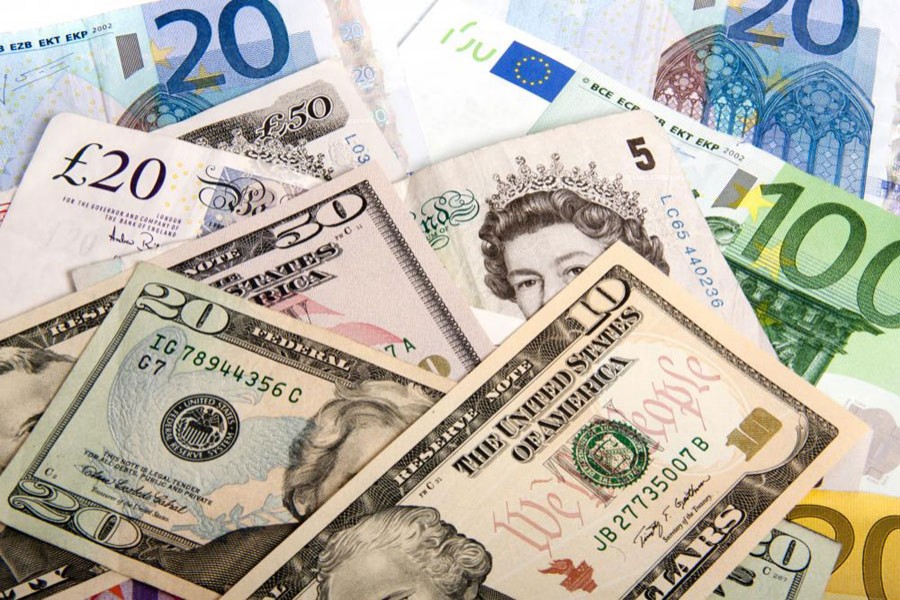
Published :
Updated :

The country's central bank, the Bangladesh Bank (BB), is learnt to have found that certain state-owned as well as privately-run commercial banks have been providing false information about the reserve of US dollar and purchasing remittance dollars at a higher rate and thereby creating artificial crisis in the country's foreign currency market. Obviously, their aim is to make illegal profits at the expense of the country's interests. This is unconscionable at a time when the country is grappling with the double whammy of falling inflow of foreign remittance and rising cost of import bills due to volatility in dollar price.
It would not be surprising if it was a case of illegal dealers in foreign currency in the black market. But here is a different scenario altogether. The financial institutions, whether private or government-owned, are believed to be the repository of public trust. And if they are engaged in such questionable activities, that is doubtless a sad commentary on the country's financial sector.
The central bank, as reported, has already inspected some 16 banks suspected of engaged in the said kind of dishonest dealings and have sought explanation for such anomalies in their foreign currency transactions from two banks in the government as well as private sector. It is hoped that the central bank would be strict in its measures against these delinquent financial institutions. This is necessary for sending a strong message to others involved in such dubious dealings.
The unstable foreign currency situation in Bangladesh is to a large extent due to the greenback becoming pricier in the international market. Which is why financial experts, bankers and foreign exchange dealers have been recommending leaving the issue of taka-dollar exchange rate to the market and not fix it officially by the central bank's diktat. It is as good as saying that taka should be treated as a commodity of the financial market whose value will hinge on the law of demand and supply. But can such measure assure that at a stage an equilibrium in the local foreign currency market will finally return? Is it not going to be a prescription for taka's going into a free fall?
What will then happen to the common people who would find that their incomes in taka, which is losing value constantly, cannot buy the essential commodities necessary for their sustenance? They have already been facing such a crisis due to skyrocketing price hike of these key ingredients of our economic life.
It is indeed a paradox that expatriate currency remitters want to be happy with more taka against a dollar. But what is the use of that extra taka whose value has already eroded due to the dollar being stronger?
In fact, as in the commodity market, the speculators in the foreign currency market also have a big role to play in the volatility of the strong currencies like US dollar. But in such foreign currency trading, the weaker currencies of the developing world have always been the ultimate losers. Stronger countries both in terms of economic and military might can survive through officially dictating the value of their indigenous currencies against, say, the US dollar, of course, much to the chagrin of the capitalist world powers. But poorer economies like Bangladesh has fewer options but to surrender and face the music for no fault of theirs other than being a small economy.
And, more often than not, the local economists and financial experts, who cannot think outside the box for the simple reason that they have earned their expertise from the same Western institutions that are basically apologists of the existing financial world order dictated by their big financial establishments as well as speculators.
But the governments of modern-day China, Russia and even India can some time break this apparently immutable rules to suit their national interests. Using its oil and gas power, Russia has been able to make its ruble stronger against US dollar despite the Western sanctions on its economy. China, on the other, has long been provoking the West's, particularly, the US's, ire for not going by the market-driven rules of the international currency regime. Even India, of late, has opted for Russian oil in exchange for ruble in the face of prevailing Western economic sanctions on Russia.
So, even the apparently unchallengeable, law-governed, world of economics and financial market can at times be bent on political grounds!
Against the backdrop of existing realities, Bangladesh will be required to decide its own course.The decision will have to be firm against all odds. For any shakiness in decision is apt to send a wrong message to the market.
It could be learnt that even with the injection of around US$6 billion in the current financial year, the stability in the foreign currency market could not be restored. Compared to the last financial year (FY 2020-21), when the amount of dollar so released in the money market to keep it stable by the central bank was only US$1.34 billion. This definitely a big jump in the amount of dollar thus injected in the market and as such is concerning, too.
It is also not beyond the knowledge of the government that a nexus is active in siphoning off US dollars from the country through creating an artificial crisis in the local forex market.
However, it would require strong monitoring to know exactly how it is happening.
The customs intelligence has already held two foreign-bound people trying to make away with a huge sum of, close to a quarter billion, US dollars. Reports also have it that cross-border smuggling out of precious foreign currency is also taking place through different underground channels.
The government needs to put its foot down and deal with the foreign currency market manipulators with an iron hand.
sfalim.ds@gmail.com


 For all latest news, follow The Financial Express Google News channel.
For all latest news, follow The Financial Express Google News channel.